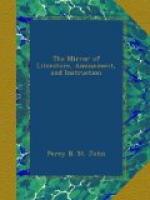Oh, go not yet, my lord, my
love, lie down by Zenia’s side,
And think not for thy white
men friends, to leave thy Indian bride,
For she will steer thy light
canoe across Ozuma’s lake,
To where the fragrant citron
groves perfume the banyan brake;
And wouldst thou chase the
nimble deer, or dark-eyed antelope,
She’ll lend thee to
their woody haunts, behind the mountain’s slope,
And when thy hunter task is
done, and spent thy spirit’s force,
She’ll weave for thee
a plantain bower, beside a streamlet’s course,
Where the sweet music of the
leaves shall lull thee to repose.
Hence in Zenia’s watchful
love, from harmful beast, or foes,
And when the spirit of the
storm, in wild tornades rides by,
She’ll hide thee in
a cave, beneath a rocky panoply.
Look, Zenia look, the fleecy
clouds move on the western gales,
And see the white men’s
moving home, unfurls her swelling sails,
So farewell India’s
spicy groves, farewell its burning clime,
And farewell Zenia, but to
love, no farewell can be mine;
Not for the brightest Spanish
maid, shall Diez’ vow be riven,
So if we meet no more on earth,
I will be thine in heaven.
Oh, go not yet, my godlike
love, stay but a moment more
And Zenia’s step shall
lead thee on, to Hayna’s golden shore,
No white man’s foot
has ever trod, the vale that slumbers there,
Or forced the gold bird from
its nest, or Gato from his lair;
But cradled round by giant
hills, lies many a golden mine,
And all the treasure they
contain, shall be my Diez thine,
And all my tribe will be thy
friends, our warrior chief thy guard,
With Zenia’s breast
thy faithful shield, thy love her sweet reward.
The valley’s won, the
friends are true, revealed the golden tide.
And Diez for Hispania’s
shore, quits not his Indian bride.
D.A.H.
* * * * *
RECENT VISIT TO POMPEII.
(For the Mirror.)
For the following details respecting a city, accounts of which, (although so many are already before the public,) are always interesting, I am indebted to the oral communication of a friend which I immediately committed to paper.
M.L.B.
My object in visiting Naples was to view that celebrated relic of antiquity—the city of Pompeii, of which, about one half is now supposed to be cleared. The workmen proceed but slowly, nevertheless something is always being done, and some new remnant of antiquity is almost daily brought to light; indeed, a fine statue was discovered, almost immediately after my visit to this interesting place, but as I had quitted Naples I could not return to see it. A stranger, is I think, apt to be much disappointed in the size of Pompeii; it was on the whole, not more than three




